|
|
|
Sort Order |
|
|
|
Items / Page
|
|
|
|
|
|
|
| Srl | Item |
| 1 |
ID:
108723
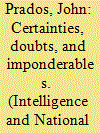

|
|
|
|
|
| Publication |
2011.
|
| Summary/Abstract |
One way to explore the question of whether and how intelligence influenced the course of the Cold War is to review its impact within a defined arena of political-military activity. This paper investigates several areas in which intelligence analysis influenced the superpower strategic competition: forging of military doctrines, the design of weapons systems, and the progression of international crises. The analysis focuses on the United States case, where it finds cases in which US intelligence had beneficial effects but others in which intelligence performance proved more problematic in either shortening the Cold War or reducing its dangers.
|
|
|
|
|
|
|
|
|
|
|
|
|
|
|
|
| 2 |
ID:
004495
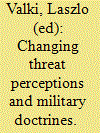

|
|
|
|
|
| Publication |
Houndmills, Macmillan, 1992.
|
| Description |
xiii, 257p.
|
| Standard Number |
0333540611
|
|
|
|
|
|
|
|
|
|
|
|
Copies: C:1/I:0,R:0,Q:0
Circulation
| Accession# | Call# | Current Location | Status | Policy | Location |
| 033513 | 355/VAL 033513 | Main | On Shelf | General | |
|
|
|
|
| 3 |
ID:
086166
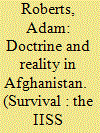

|
|
|
|
|
| Publication |
2009.
|
| Summary/Abstract |
The limitations of military doctrines and practice are often exposed, not by arguments, but by events. Thus it was mainly events in Iraq and Afghanistan that exposed the inadequacies of the so-called 'revolution in military affairs' - an idea that was popular in the United States from the mid 1990s until at least 2003. Now, Afghanistan - and the situation in Pakistan with which it is inextricably linked - is proving to be a harsh test of the revived ideas of counter-insurgency.
Afghanistan was always likely to be a difficult theatre of operations for outside military forces. Seeing this (and perhaps also because he did not want an ongoing distraction from the future invasion of Iraq, for which he was already lobbying), then-US Deputy Secretary of Defense Paul Wolfowitz said in November 2001:
In fact, one of the lessons of Afghanistan's history, which we've tried to apply in this campaign, is if you're a foreigner, try not to go in. If you go in, don't stay too long, because they don't tend to like any foreigners who stay too long.
|
|
|
|
|
|
|
|
|
|
|
|
|
|
|
|
| 4 |
ID:
096325
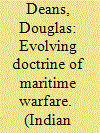

|
|
|
| 5 |
ID:
133328
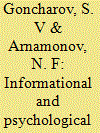

|
|
|
|
|
| Publication |
2014.
|
| Summary/Abstract |
The authors survey the American military leaders views on military doctrines believed to improve exchange, processing, analysis and dissemination of information so as to achieve informational and psychological superiority over an adversary.
|
|
|
|
|
|
|
|
|
|
|
|
|
|
|
|
| 6 |
ID:
193533
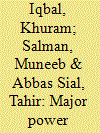

|
|
|
|
|
| Summary/Abstract |
Written military doctrines are generally seen as declaration of intent and strategic objectives by military forces. Pakistan has typically stayed averse to the trend of formal military doctrines owing to its strategic culture. However, in a first precedent Pakistan Navy released a formal military service doctrine in 2018. Yet it remained short of being a truly comprehensive formal naval doctrine. This article explores the naval doctrinal developments in Pakistan since the end of last century, its relationship with the ensuing major power competition in the Indian Ocean region, and its possible implications on doctrinal development in Pakistan.
|
|
|
|
|
|
|
|
|
|
|
|
|
|
|
|
| 7 |
ID:
138426
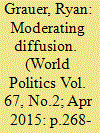

|
|
|
|
|
| Summary/Abstract |
How do military ideas, and military doctrines in particular, spread through the international system? This article extends extant work on military diffusion by exploring why some states, after deciding to adopt another's innovative warfighting system, fail to implement it. The author argues that for states to successfully implement a military doctrine developed abroad, much information about the unobservable aspects of the warfighting system is needed. States vary in their capacity to acquire the necessary knowledge because they face differing levels of resistance to military diffusion within their armed forces. Powerful groups within the military that are opposed to such adoptions are likely to use their influence to press for policies and bureaucratic maneuvers that constrain information flows between innovating states and their own state and consequently inhibit implementation and diffusion of military doctrines. Therefore successful implementation of foreign military doctrines can be expected when states face minimal resistance within their militaries, and moderated or failed implementation can be expected when opposition is more significant. A provisional test of the argument is conducted through an assessment of Argentina, Brazil, and Chile's attempts to implement the German military doctrine at the turn of the twentieth century.
|
|
|
|
|
|
|
|
|
|
|
|
|
|
|
|
| 8 |
ID:
154706
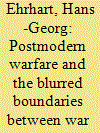

|
|
|
|
|
| Summary/Abstract |
Each age has its own wars and its own forms of warfare. In today’s evolving world risk society warfare has entered a new development stage. The states of the “global North” adapt their forms of intervention. They increasingly practice postmodern warfare characterized especially by the role of influencing the information space, networked approaches, the incorporation of indirect and covert actions, and the special quality of new technologies. This practice furthers an increasing grey zone between limiting and de-bounding of warfare. The phenomenon of postmodern warfare raises some tough questions and offers a rich research agenda.
|
|
|
|
|
|
|
|
|
|
|
|
|
|
|
|
| 9 |
ID:
104099
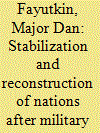

|
|
|
|
|
| Publication |
2009.
|
| Summary/Abstract |
This article focuses on an analysis of two very different approaches for stabilization and reconstruction (S&R) used by the United States in Afghanistan and the Russian Federation in Chechnya. The article discusses "Stabilization and Reconstruction" (S&R) according to military doctrines, the possibility of the S&R of the nation, the doctrinal framework for S&R processes. The Russian Federation focused its S&R policy on rebuilding the security structures in Chechnya in order to guarantee a stable security situation in the Chechen Republic. The U.S. S&R effort revolved around the reconstruction of all the security, social and financial structures of a society based on democratic principles The significant lesson from the Afghanistan and Chechnya experiences is that it is necessary to build-up the legitimate local security and social structures, which will control the situation.
|
|
|
|
|
|
|
|
|
|
|
|
|
|
|
|
|
|
|
|
|